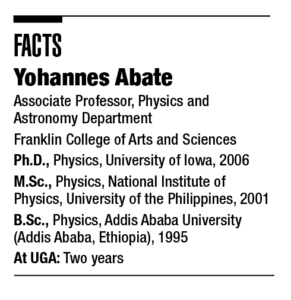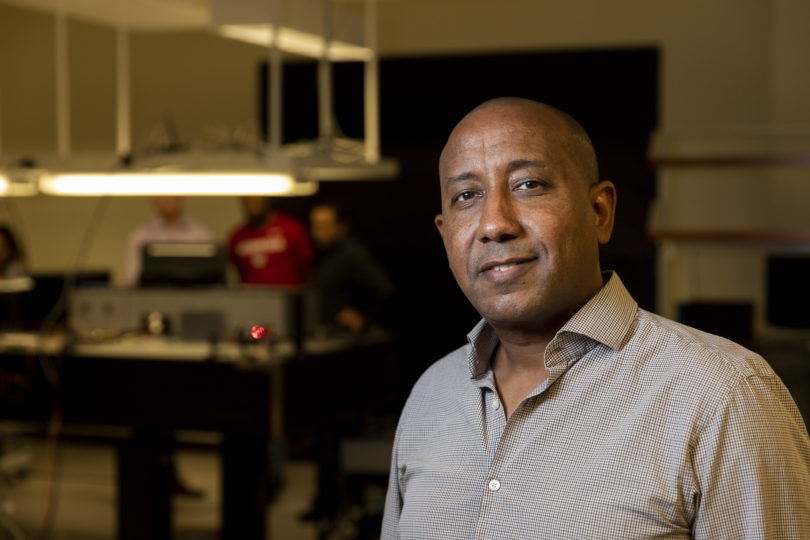Yohannes Abate established his expertise in experimental condensed matter physics focusing on fundamental studies of quantum materials at the nanoscale just as breakthroughs for next-generation materials proliferated.
 “Curiosity itself is a venerable human trait,” Abate said. “Novel quantum materials that we experiment with in the lab do not seem to result in immediate application, and it’s important to develop a thorough understanding of their properties before we can imagine their possibilities and what we might do with them.”
“Curiosity itself is a venerable human trait,” Abate said. “Novel quantum materials that we experiment with in the lab do not seem to result in immediate application, and it’s important to develop a thorough understanding of their properties before we can imagine their possibilities and what we might do with them.”
One challenge of developing quantum materials means the next wave of innovative applications and technology rely on creative thinking and fundamental research prior to their association with specific applications and devices. This order echoes many of the transformational eras in science and technology. The nanoscale can blur distinctions between classical and quantum behavior of materials, opening an unprecedented opportunity for new physics.
“When the dimension of a material becomes smaller (for example, from three dimensions to two dimensions), the material becomes confined in one axis,” Abate said. “This confinement and modification of other internal properties (such as electron internal structure), can allow emergent electronic states with striking behavior on low dimensional quantum materials.”
Low dimensional materials refer to systems in which electronic state wavefunction is confined in at least one of the three dimensions. These systems exhibit a range of intriguing possibilities including electronic, optical, thermal, mechanical and chemical properties that may result in their use in a range of nanotechnologies.
“My laboratory is interested in exploration of fundamental phenomena and elementary interactions in such materials using unique imaging techniques at very small (nanometer scale) spatial resolution,” Abate said.
A significant part of his research laboratory’s goal is to develop light-based tools that enable high-resolution imaging at wide frequency scales.
For example, the infrared and terahertz spectral regions span the energy scales of many fundamental excitations in solids that include superconductivity, electronic spin excitations, and polaritons, particles where light and matter become coupled and indistinguishable.
“The visible and near infrared frequency regions allow us to investigate the local nanoscale properties of individual quantum emitters that are at the heart of future quantum information, quantum sensing and quantum computing communities,” Abate said. “Our group has developed extensive capabilities in imaging and spectroscopy at small length scales in all of these energy scales.”
These tools open transformational fundamental science possibilities in physics, chemistry, biology and neuroscience as well as various novel applications in communication, defense, remote probing and noninvasive imaging.
Abate, who arrived at UGA in 2017, has been able to build his lab and has multiple, ongoing grants. One from the National Science Foundation was awarded to investigate the fundamental physics of quantum systems at the nanoscale in metamaterials, where light and matter coexist in the form of polaritons, whose propagation can be imagined in real-space.
“Metamaterials host unique properties not found in naturally occurring materials, that means there are novel properties which lead, ultimately, to novel devices that do not exist,” Abate said. “There is a whole new range of applications that are not yet imagined.”
What is important, Abate explained, is to focus on the discovery of these fundamental phenomena even when it seems void of applications at the moment. It takes time, but new uses and applications will arrive.
“We search for new materials and new properties with an eye for application in high-speed electronics and devices, but it takes a lot of exploring, and it is the journey that is exciting,” Abate said.








